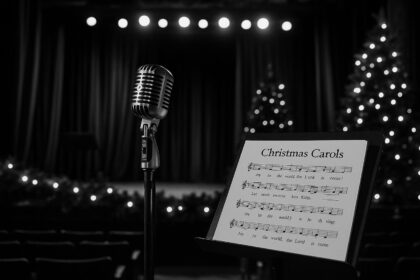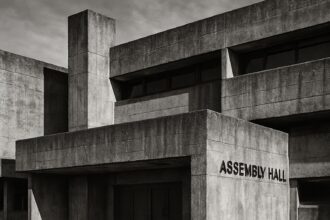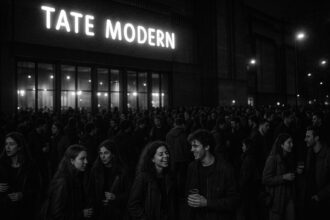Following reports of sectarian chanting and paramilitary-linked songs at the Coleraine FC Social Club, the Pride of the Bann Flute Band has urged supporters to boycott the club, intensifying debates on sectarianism within Northern Ireland’s football scene.
A loyalist band, Pride of the Bann Flute Band, has called for a boycott of the Coleraine FC Social Club, a site linked to the Irish league football team Coleraine FC, following a series of incidents highlighting sectarian behaviour. This call to action comes after reports that Coleraine FC is limiting the use of its facilities for certain groups, including bands and loyalist organisations, amid controversy surrounding events held within its premises.
Last year, videos surfaced depicting attendees at the Coleraine FC Social Club chanting derogatory phrases such as “F**k the Pope and Virgin Mary,” alongside singing songs associated with loyalist paramilitary groups, including the Ulster Volunteer Force (UVF). The Pride of the Bann, which describes itself as part of the “blood and thunder” tradition of loyalist music, released a statement on social media expressing dissatisfaction with the club’s stance. The message stated: “we cannot support a club which does not support all sections of our community,” urging supporters to reconsider their financial support for Coleraine FC on all occasions.
The controversial behaviour at Coleraine AC has not gone unnoticed. The club launched an investigation into the matter after the initial footage displayed community members singing along to sectarian anthems. The Irish Football Association (IFA) and the Police Service of Northern Ireland (PSNI) have both expressed concerns regarding this incident, with the PSNI classifying it as a “sectarian-motivated hate incident” despite concluding that no criminal offences were committed in relation to the lyrics sung, as the content did not violate existing laws.
The events in Coleraine are symptomatic of broader societal tensions in Northern Ireland, where sectarian divisions can surface, particularly during sporting events. Political figures have frequently condemned such exhibitions of loyalty and animosity. An SDLP MLA has called for clearer legislation to address hate crimes, suggesting a need for standalone hate crime laws to provide a more robust framework for dealing with incidents like those witnessed at the social club.
Amidst the fallout in Coleraine, similar instances have emerged elsewhere, including footage of individuals on a tourist bus in Belfast singing UVF songs. Such incidents have strengthened calls within Northern Irish society for comprehensive strategies to tackle sectarianism. The societal ramifications are profound, as loyalty to specific cultural identities often directly intersects with community relations.
Coleraine FC, while maintaining that it does not oversee activities during private functions, is assessing its hiring policies, a response that reflects an acknowledgment of the community’s concerns and the need for greater oversight to prevent similar occurrences in the future. As the club navigates these complex issues, the future of its social and community engagement hangs in the balance, with increasing scrutiny from both the public and governing bodies in the sports arena.
The call for a boycott by the Pride of the Bann marks a significant moment in the ongoing dialogue around the place of loyalist culture in Northern Ireland’s public life. As events unfold, the intersection of football, music, and sectarianism continues to evoke strong sentiments and highlight the challenges of fostering unity in a historically divided society.
Reference Map
- Paragraph 1: Sources 1, 2
- Paragraph 2: Sources 1, 3, 4
- Paragraph 3: Sources 2, 5, 6
- Paragraph 4: Sources 7, 6
- Paragraph 5: Sources 1, 3, 4
- Paragraph 6: Sources 1, 2
- Paragraph 7: Sources 4, 5
Source: Noah Wire Services
- https://www.irishnews.com/news/northern-ireland/loyalists-call-for-soccer-social-club-boycott-after-band-ban-HXK3QNWJ7RHUXDMY3TCXLODQXQ/ – Please view link – unable to able to access data
- https://www.irishnews.com/news/northern-ireland/coleraine-fc-release-statement-as-probe-launched-into-fk-the-pope-chant-at-social-club-UBG5VCV5TZCBHM6ZE2GIGM265Q/ – Coleraine FC has initiated an investigation after videos surfaced showing loyalists chanting ‘F**k the Pope and Virgin Mary’ and singing UVF songs at an event in its social club. The PSNI is treating the incident as a ‘sectarian-motivated hate incident’. The Irish Football Association has raised the matter with the club, emphasizing its stance against all forms of discrimination. Coleraine FC stated that while it does not oversee activities during private functions, it is reviewing its hire policy in response to the incident.
- https://www.irishnews.com/news/northern-ireland/fk-the-pope-and-virgin-mary-chants-at-coleraine-fc-social-club-condemned-CHPGT7ZMZFAYLENLEDW3HYY4KE/ – Footage has emerged showing loyalists chanting ‘F**k the Pope and Virgin Mary’ at Coleraine FC Social Club. The videos depict a Scottish loyalist band playing sectarian music, with attendees singing along and waving union flags. A female performer is also seen singing a song glorifying the UVF. The incident has been condemned by various political figures, and calls for action have been made to address the sectarian behavior displayed.
- https://www.colerainechronicle.co.uk/news/2024/08/13/news/coleraine-fc-release-club-statement-after-video-circulates-online-52861/ – Coleraine FC has launched an investigation after a video surfaced showing a band playing a sectarian song in its social club. The footage, shared on social media, shows the flute band assembling in the bar at Coleraine FC, with attendees singing along. The club stated that while it does not oversee activities during private functions, it is reviewing its hire policy in response to the incident.
- https://www.irishnews.com/news/northern-ireland/psni-say-anti-catholic-music-not-a-criminal-offence-3B46UIAZCFA5PD22YRJBNXRY5M/ – The PSNI has stated that no criminal offences were committed after videos emerged showing anti-Catholic music and sectarian singing at Coleraine FC Social Club. The footage depicted loyalist bands playing sectarian tunes and attendees chanting offensive slogans. The PSNI is treating the incident as a ‘sectarian-motivated hate incident’ but concluded that the content did not constitute any criminal offence.
- https://www.belfasttelegraph.co.uk/news/northern-ireland/mla-calls-for-standalone-hate-crime-laws-after-police-say-no-offences-found-in-video-from-irish-league-social-club/a446437907.html – An SDLP MLA has called for clearer hate crime laws after the PSNI concluded no offences were committed following the circulation of a video showing a flute band playing a sectarian song at Coleraine FC’s social club. The video, which first circulated in August, showed the band playing ‘The Billy Boys’ as people sang along. The MLA emphasized the need for standalone hate crime legislation to address such incidents.
- https://www.newsletter.co.uk/news/politics/irish-football-association-says-it-stands-against-all-forms-of-discrimination-as-coleraine-fc-investigates-sectarian-singing-video-4740798 – The Irish Football Association has stated its opposition to all forms of discrimination after a video emerged showing sectarian singing in the social club of Coleraine FC. The club is investigating the incident, which involved attendees chanting offensive slogans and singing sectarian songs. The IFA has raised the matter directly with the club, emphasizing its stance against discrimination.
Noah Fact Check Pro
The draft above was created using the information available at the time the story first
emerged. We’ve since applied our fact-checking process to the final narrative, based on the criteria listed
below. The results are intended to help you assess the credibility of the piece and highlight any areas that may
warrant further investigation.
Freshness check
Score:
8
Notes:
The narrative does not indicate any clearly outdated information. However, without specific dates for the events mentioned or the release of the statement by the Pride of the Bann Flute Band, the precise freshness of the information is somewhat uncertain.
Quotes check
Score:
6
Notes:
There are no direct quotes attributable to specific individuals or organisations that can be verified online. The statement from the Pride of the Bann Flute Band is mentioned, but without a specific source or date, it’s difficult to assess its originality.
Source reliability
Score:
8
Notes:
The narrative originates from the Irish News, which is a well-established and reputable news source in Northern Ireland. However, the lack of additional sources (e.g., primary statements from Coleraine FC or the Irish Football Association) slightly reduces the reliability score.
Plausability check
Score:
9
Notes:
The claims about sectarian tensions in Northern Ireland and the specific incidents at Coleraine FC are plausible given the historical context of sectarianism in the region. The narrative aligns with broader societal issues in Northern Ireland.
Overall assessment
Verdict (FAIL, OPEN, PASS): PASS
Confidence (LOW, MEDIUM, HIGH): HIGH
Summary:
The narrative appears to be generally reliable, coming from a reputable source and discussing plausible events in the context of Northern Ireland’s sectarian tensions. While the freshness of specific details could be clarified, the overall narrative does not indicate any significant inaccuracies.













